课后练习答案(1)
最新部编人教版五年级下册数学课本课后习题参考答案

第5页做一做答案4是24的因数,24是4的倍数。
13是26的因数,26是13的倍数。
25是75的因数,75是25的倍数。
9是81的因数,81是9的倍数。
练习二答案1、36的因数:1,2,3,4,6,9,12,18,36。
60的因数:1,2,3,4,5,6,10, 12, 15,20,30,60。
2、(1)10的因数:1,2,5,10。
17的因数:1,17。
28的因数:1,2,4,7,14,28。
32的因数:1,2,4,8,16,32。
48的因数:1,2,3,4,6,8,12, 16,24,48。
(2)(答案不唯一)4的倍数:4,8,12,16,20。
7的倍数:7,14,21,28,35。
10的倍数:10,20, 30,40,50。
6的倍数:6,12,18,24, 30。
9的倍数:9,18, 27, 36,45。
3、把5,35,10,55,60,100这6颗星星涂上黄色。
4、15的因数有1,3,5,15。
15是1,3,5,15的倍数。
5、(1)√(2)×(3)√(4)×6、1 2 47、(1)18 (2)1 (3)428、这个数可能是3,6,21,42。
思考题14和21的和是7的倍数;18和27的和是9的倍数。
发现:两个数分别是一个数的倍数,这两个数的和也是这个数的倍数。
第9页做一做答案2的倍数有24,90,106,60,130,280,6018,8100。
5的倍数有35,90,15,60,75,130,280,8100。
既是2的倍数,又是5的倍数:90,60,130,280,8100。
发现:既是2的倍数,又是5的倍数的数的个位一定是0。
第10页做一做答案3的倍数有24,96。
在24后面可放卡片:0,3,6,9。
在58后面可放卡片:2,5,8。
在46后面可放卡片:2,5,8。
在96后面可放卡片:0,3,6,9。
练习三答案1、奇数有33,355,123,881,8089,565,677。
课后练习题--答案(1)

第三章 练习题1.某公司拟购置一项设备,目前有A 、B 两种可供选择。
A设备的价格比B设备高50000元,但每年可节约维修保养费等费用10000元。
假设A 、B 设备的经济寿命均为6年,利率为8%,该公司在A 、B 两种设备中必须择一的情况下,应选择哪一种设备?[答案:]如果选择A 项目,则多支付投资额50000元,而可以每年节约保养费用1000元,-37714.622910000-5000068%P/A 1000050000-=⨯+=⨯+),,( 所以,A 方案不可选。
2.某人现在存入银行一笔现金,计划8年后每年年末从银行提取现金6000元,连续提取10年,在利率为7%的情况下,现在应存入银行多少元?[答案:]10-10)1(1i i)(1-16000 107%P/F 107%P/A 6000i +⨯+⨯=⨯),,)(,,( 41.24526582.00236.76000元=⨯⨯=3.某人5年后需用现金40000元,如果每年年末存款一次,在年利率为6%的情况下,此人每年年末应存入现金多少元?[答案:]元,,7095.8556%F/A 40000A ==4.某企业集团准备对外投资,现有三家公司可供选择,分别为甲公司、乙公司、丙公司,这三家公司的年预期收益及其概率的资料如表3-4所示:表3-4 某企业集团预期收益及其概率资料要求:假定你是该企业集团的稳健型决策者,请依据风险与收益原理作出选择 [答案:]230.250.5200.340E =⨯+⨯+⨯=甲 240.25-0.5200.350E =⨯+⨯+⨯=)(乙 80.230-0.520-0.380E =⨯+⨯+⨯=)()(丙12.490.223-50.523-200.323-40222=⨯+⨯+⨯=)()()(甲σ 19.470.224-5-0.524-200.324-50222=⨯+⨯+⨯=)()()(甲σ0.5432312.49==甲q 0.8112419.47==乙q选择甲方案。
八上)生物课后习题答案 (1)

八上生物课后练习题答案5.1.1 腔肠动物和扁形动物P71.把符合下列动物类群特征的选项填入括号内。
腔肠动物( ABE ) 扁形动物( ACD )A.没有肛门B.有刺细胞 C.大多数种类身体扁平 D.部分种类没有专门的消化器官E.身体呈辐射对称。
2.如果一条小溪原来可以采集到水螅,现在却采集不到,你认为最可能的原因是什么?答:水螅通常生活在清洁的淡水中,若水体受到污染,水螅无法存活,则采集不到水螅。
3.有些人喜欢吃生鱼片等食物,你认为不将鱼煮熟直接食用是否安全?为什么?答:不安全。
因为生鱼片中可能含有华枝睾吸虫的幼虫,若不将鱼煮熟直接食用,有可能会感染华枝睾吸虫病。
5.1.2 线形动物和环节动物P111.判断下列说法是否正确。
正确的画“√”,错误的画“×”。
(1)线形动物都是寄生的。
( × ) (2)蚯蚓的运动是仅靠刚毛完成的。
( × )2.以下动物中,( BEF )属于环节动物,( ACD )属于线形动物。
A.蛔虫; B.蚯蚓; C.小麦线虫; D.丝虫; E.蛭; F.沙蚕。
3.如何区别某个动物是环节动物还是线形动物?答:根据动物的身体是否分节,是否具有刚毛和疣足等运动器官,来作出判断。
(环节动物身体分节,有刚毛或疣足)4.雨后,蚯蚓往往会爬到地面上来,这是为什么?如果农田中的蚯蚓消失了,农作物的生长会不会受到影响?为什么?答:下雨后,土壤缝隙中充满水,蚯蚓周围的氧气不足,蚯蚓爬到地面上进行呼吸。
如果农田中没有了蚯蚓,农作物的生长有可能受影响。
因为蚯蚓可以松土,改善土壤成分结构增加土壤肥力。
5.1.3 软体动物和节肢动物P171.判断(正确的画“√”,错误的画“×”)。
(1)软体动物都生有贝壳。
(× ) (2)节肢动物的附肢分节,身体不分节。
(× )2.下列关于动物的生活环境及获取食物的方式的叙述中,正确的是:(A )A.腔肠动物生活在水中,利用刺细胞帮助捕获猎物; B.寄生虫终生生活在寄主体表或体内,靠获取寄主体内的养料生存; C.软体动物生活在水中,靠入水管、出水管获取水里的食物颗粒; D.节肢动物生活在陆地上,利用口器获取食物。
新编大学德语1课后练习答案

新编大学德语(klick auf deutsch)练习答案(第一册) Lösungen:GÜ 11) eine, Sie2) eine, Sie3) ein, Er4) ein, EsGÜ 21) Die2) Die3) Der4) DasGÜ 41) Sie2) du3) Sie4) du5) du, du6) SieGÜ 51) Sie, ich2) ihr, Wir3) Sie, Wir4) er, Er5) sie, sie6) du, ichGÜ 6Er studiert Informatik.Ich komme aus Deutschland. Sprechen Sie bitte laut und langsam!Wir lernen hier Deutsch.Wohnst du im Studentenheim?Was heißt das auf Deutsch?Wie buchstabiert man das?GÜ 71) heißt, Ist2) wohnst, Studierst, arbeite, bin3) sind, Kommen4) Seid, macht, lernen, wohntGÜ 81) Machen Sie bitte Übung vier!2) Schreiben Sie bitte Dialoge!3) Sprechen Sie bitte langsam!4) Lesen Sie bitte laut!GÜ 91) Sprechen wir leise!2) Öffnen wir die Bücher!3) Lesen wir Text drei!4) Machen wir Übungen!GÜ 10Lesen Sie! ( Du liest er liest ihr lest)Schreiben Sie!Hören Sie!Sprechen Sie!(ich spreche du sprichst er spricht ihr sprecht) GÜ 11A 4);B 2);C 3)D 1)Einheit 3Uebungen1) Deutschunterricht haben2) 6:153) 8~11:454) Vorlesung besuchen5) Nein, sie fruehstueckt meistens gut und isst nicht zu Mittag.6) Nein, er lernt heute abend Deutsch. Am Donnerstag schreiben sie eine Pruefung.7) Nein, er macht da Hausaufgaben.Tue 21) c2) c3) a4) b5) cTue 3nach Hause fahrenzu Mittag essenZeit habenSport treibeneine Vorlesung besuchenKaffee trinkeneine Pruefung schreibenTue 4Sport; Deutschunterricht; Mittag; Vorlesung; fahrenGUe 11) neunundachtzig2) einhundertachtunddreissig3) neunhundertsiebenundzwanzig4) 4005) dreitausendachthunderteinundsechzig6) 767) dreihundertfuenf8) 7829) zweitausendvierundfuenfzig10) 654Gue 41) schlaefst2) isst, esse3) Sprichst; spricht4) fahre; fahrt, faehrt5) Hast; habtGue 5Ich bin Studentin.Thomas liest den Text zu leise.Ihr sprecht schon gut Deutsch.Von wann bis wann schlaefst du denn?Wir haben am Freitag Deutschunterricht.Isst Gabi noch zu Mittag?Fahren Sie auch nach Berlin?GUe 6Bist; kommst; studierst; lerne; sprichst; Kennst; esseein, ein, einen, eine, ein, eineGUe 8den; die; die; dieGUe9Herr Lorenz-> ihn Herrn Lorenzder Deutschlehrer-> ihnPetra-> sieHans-> ihndie Chemielehrerin-> sieFrau Beckmann-> sieGUe 10der Boernerplatz-> ihndas Goethe- Haus-> esdas Studentenheim-> esdie Post-> siedie Universitaet-> sieGUe 11eine; /; Er; ihn; eine; mich; mich; eine; /; sie; das; ein; es; esEinheit 4GÜ 1Kommt, herein, steht auf, macht, zu, machen, weiter, Machen, auf GÜ 2Dialog 1: kaufst, ein, laden, ein kommen, anDialog 2: siehst, ausDialog 3: hast , vor, Kommst, mit1) Ihr, Ihre, Ihr, Ihre2) Seine, Seine, Sein, SeinGÜ 41) Chef: Wo ist meine Brille?Sekr: Ihre Brille? Ach, das weiss ich leider nicht.2) Chef: Wo ist mein Brief?Sekr: Ihren Brief? Ach, das weiss ich leider nicht.7) Chef: Wo ist mein Telefonbuch?Sekr: Ihr Telefonbuch? Ach, das weiss ich leider nicht. GÜ 51) Student: Wo ist mein Fahrrad?Studentin: Dein Fahrrad? Ach, das weiss ich nicht.2) Student: Wo ist mein Schluessel?Studentin: Deinen Schluessel? Ach ,das weiss ich nicht.6) Student: Wo ist meine Diskette?Studentin: Deine Diskette? Ach, das weiss ich nicht.GÜ 71) Unser, unsere2) Unsere3) Unser, Unsere4) Eure, UnsereGÜ 8C AD BGÜ 9/eineineneine, ein/, ////einGÜ 102)C 3)B 4)B 5) CGÜ 112)Ja3) Nein4) Doch5) Doch6) Ja7) NeinEinheit 5GÜ 11) Herr Muller mag die Atmosphaere im China- Restaurant.2) Ich mag Schweinebraten mit Nudeln sehr gut.3) Die Studenten moegen die Deutschlehrerin.4) Moegt ihr Berlin?5) Die Oma mag die Blumen.6) Die Schlueler moegen Jazz-Musik.GÜ 2A: Ich trinke einen Kaffee. Und was moechtest du?B: Ich haette gern einen Tee.A: Ich trinke ein Wasser. Und was moechtest du?B: Ich haette gern einen Apfelsaft.A: Ich trinke einen Sprite. Und was moechtest du? B: Ich haette gern eine Fanta.GÜ 3A: Wir essen Reis. Und was moechtet ihr?B: Wir haetten gern Nudeln.A: Wir essen Fleisch. Und was moechtet ihr?B: Wir haetten gern Fisch.A: Wir essen Schweinebraten. Und was moechtet ihr? B: Wir haetten gern Schnitzel.A: Wir essen Eier. Und was moechtet ihr?B: Wir haetten gern Wurst.A: Wir essen Kaese. Und was moechtet ihr?B: Wir haetten gern Kartoffeln.GÜ 4A: Ich moechte zum China- Restaurant. Und du?B: Ich moechte zum McDonald’s.A: Ich moechte nach Hamburg. Und du?B: Ich moechte nach Berlin.A: Ich moechte zur Vorlesung. Und du?B: Ich moechte ins Kino.A: Ich moechte auf die Party. Und du?B: Ich moechte in die Disko.GÜ 5A: Moechtest du Wurst essen?B: Nein, Wurst mag ich nicht so gern.A: Moechte Thomas auch keine Wurst?B: Doch, er mag Wurst sehr gern.A: Moechtest du Eis essen?B: Nein, Eis mag ich nicht so gern.A: Moechte Thomas auch kein Eis?B: Doch, er mag Eis sehr gern.A: Moechtest du Kaese essen?B: Nein, Kaese mag ich nicht so gern.A: Moechte Thomas auch keinen Kaese?B: Doch, er mag Kaese sehr gernA: Moechtest du Broetchen essen?B: Nein, Broetchen mag ich nicht so gern.A: Moechte Thomas auch kein Broetchen?B: Doch, er mag Broetchen sehr gern..A: Moechtest du einen Apfelkuchen essen?B: Nein, Apfelkuchen mag ich nicht so gern.A: Moechte Thomas auch keinen Apfelkuchen?B: Doch, er mag Apfelkuchen sehr gern.A: Moechtest du Haehnchen essen?B: Nein, Haehnchen mag ich nicht so gern.A: Moechte Thomas auch kein Haehnchen?B: Doch, er mag Haehnchen sehr gern.GÜ 61)A. Wem gefaellt der Computer? Er gefaellt dem Lehrer.B. Wem gefaellt die Kamera? Sie gefaellt seiner Freundin.C. Wem gefaellt das Restaurant? Es gefaellt Herrn Naumann.2)A. Wem schmecken Nudeln? Sie schmecken seinem Opa.B. Wem schmeckt die Zwiebelsupppe? Sie schmeckt meiner Frau.C. Wem schmeckt das Schnitzel? Es schmeckt dem Kind.3)A. Wem hilft er? Seiner Oma hilft er.B. Wem helfe ich? Der Studentin helfe ich. /Ich helfe der Studentin.C. Wem helfen die Eltern? Den Kindern helfen die Eltern.4)A. Wem dankt das Geburtstagskind? Es dankt den Gaesten.B. Wem dankt der Gast? Er dankt dem Kellner.C. Wem dankt Hans? Er dankt seinen Freunden.5)A. Wem gehoert der Schluessel? Herrn Li gehoert der Schluessel.B. Wem gehoert das Buch? Dem Schueler gehoert das Buch.GÜ 7Uns, dir, euch, mir, ihnenGÜ 81) ihr, 2) ihnen 3) ihr 4) ihm 5) ihr 6)ihrGÜ 9Oma sagt zu Hans:Frag mal Herrn Mueller!Bring mir die Buecher!Fahr mal hin!Mach mal eine Pause!Trink nicht so viel Bier!GÜ 101) Mach die Tuer zu! Es ist sehr kalt.2) Bring Wasser! Oma moechte Wasser trinken.3) Kauf Tabletten! Oma moechte Tabletten nehmen.4) Hol den Arzt! Oma moechte mit dem Arzt sprechen.GÜ 11Lest den Text lautvor!Schreibt die neuen Saetze!Hoert die Kassette!Habt keine Angst vor der Pruefung!HÜ 11) R 2) F 3) F 4) R 5) FHÜ 21) Thomas mag den Cappuccino nicht so gern.2) Die Kellnerin empfiehlt Schmarzwaelder Kirschtorte.3) Die Schwarzwaelder Kirschtorte schmeckt Thomas nicht so gut.4) Fuer Xiaoming kostet es 5 Euro 50. Er bezahlt 6 Euro.LÜ 11) Im Norden gibt es Gerichte mit frischen Fischen, in Bayern Weisswurst, in Schwaben Kaesespaetzle und Maultaschen, in Thueringen Rostbratwurst.2) In Deutschland gibt es italienische, griechische, tuerkische, spanische und chinesische Restaurants.3) Man isst oft eine Bratwurst mit Ketchup und ein Broetchen oder eine Pizza oder einen Doener Kebab.4) Ein Schnellimbiss kostet 2 bis 3 Euro.5) Man isst oft einen Hamburger oder Cheeseburger mit Pommes Frites und trinkt dazu eine Cola.6) Die Essensgewohnheiten in Deutschland sind sehr unterschiedlich.Einheit 6GÜ 11) Sie sagt, ich soll die U2 nehmen.2) Sie sagt, ich soll mitkommen.3) Sie sagt, ich soll nachts keine laute Musik hoeren.4) Sie sagt, ich soll die Hausordnung genau lesen.GÜ 21) Der Vater sagt, ich darf nur eine Stunde lang Ball spielen.2) Die Oma sagt, ich darf keinen Laerm machen.3) Der Opa sagt, ich darf nicht in meinem Zimmer tanzen.4) Die Mutter sagt, ich darf nicht immer vor dem Fernseher sitzen.GÜ 31) Er muss sofort die Polizei anrufen.2) Er muss im Bett bleiben.3) Sie muss lange sitzen und viel tippen.4) Er muss 100 Euro bezahlen.GÜ41- c2- e3- f4- d5- b6- aGÜ 52) darf3) muss, muessen4) sollGÜ 71- d2- g3- f4- e5- c6- h7- aGÜ 81) haengen, haengt2) Legen, liegen3) Stecken, stckt4) Stellen, steht(Stellen, legenLegen Sie das Buch auf den Tisch. Das Buch liegt auf dem Tisch. Stehen, liegenHaengen, stecken)Einheit 7TÜ 21- h2- 2g3- a4- e5- d6- c7- f8- bTÜ 4A: findestB: gefaelltA:haeltstB: Meinst du den blauen?A: schwarzenB: gefallen, nehmenA: blauen,B: wie vielA: 50B: keine billigerenA: Nimm, 35B: nehmeTÜ 5schenken, schlaegt...vor, kaufen, hilft, empfiehlt, gefaellt, steht, wuenschenGÜ 11) B: Kannst du ihn nicht heute tragen?A: Nein, ich will ihn morgen tragen.2) ihn3) sie4) sie5) esGÜ 21) kann2) Willst, Kann3) Kann, kann, kannst, will4) Willst, will, kann, kannst5) Kann, will, koennenGÜ 31) Thomas will nicht kommen.2) Peter will nicht kommen.3) Klaus darf (kann) nicht kommen.4) Wang Donghui kann nicht kommen.5) Sabine kann nicht kommen.6) Anna will nicht kommen.7) Trudi darf nicht kommen.GÜ 51)-en, -e2)-e, -e3)-e, -en, -en, -en, -e4)-en, -en, -e, -en, -e, -en, -enGÜ 61) Die mache ich nicht.2) Das trinke ich nicht.3) Den besuche ich nicht.4) Mit der lerne ich nicht zusammen.5) Die rufe ich nicht an.6) Dem helfe ich nicht.GÜ 81) welchem, dem neuen und langsamen/, diesem2) welches,das grosse und teure Zimmer/, dieses3) welche, die moderne und unpraktische/, diese4) das schoene und laute/, diesesGÜ 91) A: Du, sag mal, was schenken wir meinem Vater?B: Deinem Vater? Schenken wir ihm eine Flasche Wein, oder?2) meinen Grosseltern, Deinen Grosseltern, ihnen einen Teppich3) meiner Schwester, Deiner Schwester, ihr ein Fahrrad4) unserem Nachbarskind, Unserem Nachbarskind, ihm eine Kaffenkanne5) A: Du, sag mal, wem schenken wir die Krawatte?B: Die Krawatte? Schenken wir sie meinem Chef, oder?6) die Kaffeetassen?, Die Kaffeetassen, sie meiner Tante7) den Wecker, Den Wecker, ihn meinen Eltern8) das Bild, Das Bild, es meinem OnkelGÜ 101) Mutter: O.K. Ich zeige es ihnen.2) Ich kaufe ihn ihm.3) Ich bringe sie ihr.4) Ich hole ihn euch.5) Ich schenke es dir.6) Ich gebe ihn dir sofort.7) Ich hole sie dir sofort.IÜ 21) viel Erfolg!2) gute Besserung!3) herzlichen Glueckwunsch!4) gute Reise!5) viel Vergnuegen/ viel Spass!。
公共营养师课后练习题(1)答案
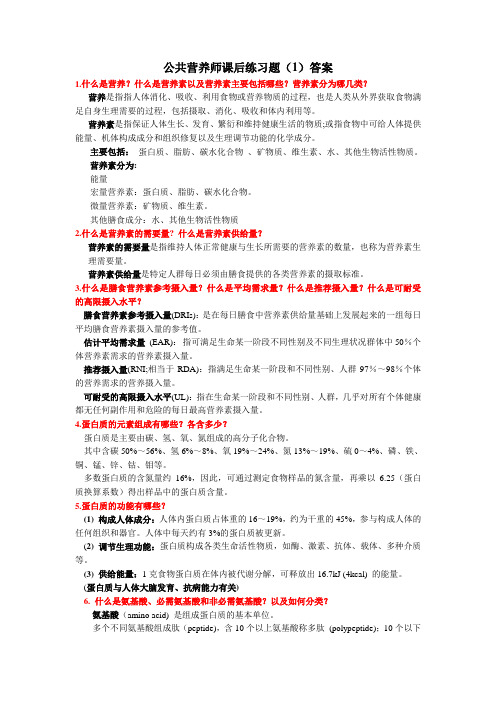
公共营养师课后练习题(1)答案1.什么是营养?什么是营养素以及营养素主要包括哪些?营养素分为哪几类?营养是指指人体消化、吸收、利用食物或营养物质的过程,也是人类从外界获取食物满足自身生理需要的过程,包括摄取、消化、吸收和体内利用等。
营养素是指保证人体生长、发育、繁衍和维持健康生活的物质;或指食物中可给人体提供能量、机体构成成分和组织修复以及生理调节功能的化学成分。
主要包括:蛋白质、脂肪、碳水化合物、矿物质、维生素、水、其他生物活性物质。
营养素分为:能量宏量营养素:蛋白质、脂肪、碳水化合物。
微量营养素:矿物质、维生素。
其他膳食成分:水、其他生物活性物质2.什么是营养素的需要量? 什么是营养素供给量?营养素的需要量是指维持人体正常健康与生长所需要的营养素的数量,也称为营养素生理需要量。
营养素供给量是特定人群每日必须由膳食提供的各类营养素的摄取标准。
3.什么是膳食营养素参考摄入量?什么是平均需求量?什么是推荐摄入量?什么是可耐受的高限摄入水平?膳食营养素参考摄入量(DRIs):是在每日膳食中营养素供给量基础上发展起来的一组每日平均膳食营养素摄入量的参考值。
估计平均需求量(EAR):指可满足生命某一阶段不同性别及不同生理状况群体中50%个体营养素需求的营养素摄入量。
推荐摄入量(RNI;相当于RDA):指满足生命某一阶段和不同性别、人群97%~98%个体的营养需求的营养摄入量。
可耐受的高限摄入水平(UL):指在生命某一阶段和不同性别、人群,几乎对所有个体健康都无任何副作用和危险的每日最高营养素摄入量。
4.蛋白质的元素组成有哪些?各含多少?蛋白质是主要由碳、氢、氧、氮组成的高分子化合物。
其中含碳50%~56%、氢6%~8%、氧19%~24%、氮13%~19%、硫0~4%、磷、铁、铜、锰、锌、钴、钼等。
多数蛋白质的含氮量约16%,因此,可通过测定食物样品的氮含量,再乘以6.25(蛋白质换算系数)得出样品中的蛋白质含量。
英译汉 课后练习作业1 参考答案
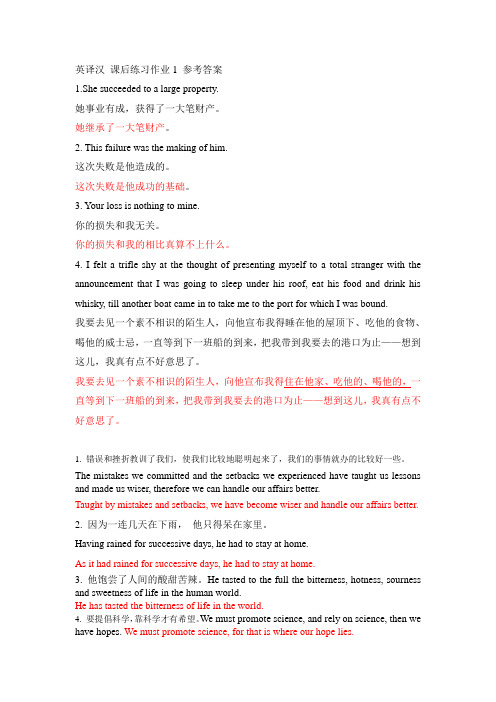
英译汉课后练习作业1 参考答案1.She succeeded to a large property.她事业有成,获得了一大笔财产。
她继承了一大笔财产。
2. This failure was the making of him.这次失败是他造成的。
这次失败是他成功的基础。
3. Y our loss is nothing to mine.你的损失和我无关。
你的损失和我的相比真算不上什么。
4. I felt a trifle shy at the thought of presenting myself to a total stranger with the announcement that I was going to sleep under his roof, eat his food and drink his whisky, till another boat came in to take me to the port for which I was bound.我要去见一个素不相识的陌生人,向他宣布我得睡在他的屋顶下、吃他的食物、喝他的威士忌,一直等到下一班船的到来,把我带到我要去的港口为止——想到这儿,我真有点不好意思了。
我要去见一个素不相识的陌生人,向他宣布我得住在他家、吃他的、喝他的,一直等到下一班船的到来,把我带到我要去的港口为止——想到这儿,我真有点不好意思了。
1. 错误和挫折教训了我们,使我们比较地聪明起来了,我们的事情就办的比较好一些。
The mistakes we committed and the setbacks we experienced have taught us lessons and made us wiser, therefore we can handle our affairs better.Taught by mistakes and setbacks, we have become wiser and handle our affairs better.2. 因为一连几天在下雨,他只得呆在家里。
部编语文五下军神课后练习精选(含答案)1
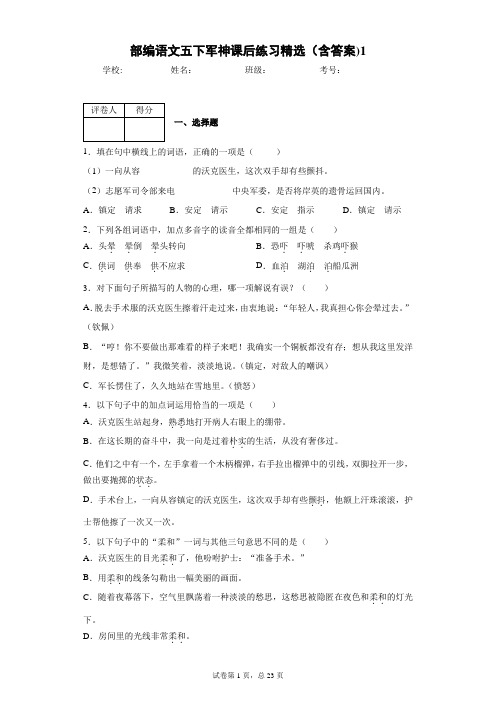
(3)文中画波浪线的句子充分流露出了沃克医生内心的______和_______。朗读这句话时要用________(A.激动高昂 B.低沉缓慢)的语调。
12.选文第1自然段为什么要着重描写沃克医生呢?
__________________________________________
将军的目光严厉起来。他转过身,盯着上校:“不是有高海拔地区执勤年限规定吗?他,这么长时间,为什么?”上校嗫嚅着,盯了哨兵一眼。将军显然是生气了,他提高嗓门:“你就这样带兵?嗯?”上校避开将军的目光,轻声说:“这儿是艰苦,可总得……”“假如是你的亲人,你会怎么样?”这时,一个随员走过来,悄声对将军说:“他是团长的……亲弟弟……”
一个冻僵的老战士,倚靠光秃秃的树干坐着。他一动不动,好似一尊塑像,身上落满了雪,无法辨认他的面目,但可以看出,他的神态十分镇定,十分安详:右手的中指和食指间还夹着半截纸卷的旱烟,火已被雪打灭;左手微微向前伸着,好像在向战友借火。单薄破旧的衣服紧紧地贴在他的身上。
事迹:___________________
赞扬:__________________
21.读完材料,同学们对“英雄”展开了讨论。请你结合所给材料,对同学们的讨论作总结发言。
小辉:古代的民族英雄如岳飞、戚继光等,勇武过人,实在令人钦佩。
小丹:那些动漫电影里的英雄,如超人、钢铁侠等才叫厉害,每次都能拯救地球。
部编语文五下军神课后练习精选(含答案)1
学校:___________姓名:___________班级:___________考号:___________
评卷人
得分
一、选择题
逻辑学课后练习题答案(人大完整版)[1]
![逻辑学课后练习题答案(人大完整版)[1]](https://img.taocdn.com/s3/m/c5a95c31ee06eff9aef80770.png)
(17)? T ? ? Q 规则T,(7)(16),充分条件假言推理肯定前件式
(18)? T 规则T,(17),联言推理分解式
3. 限制正确。概括错误,因为并非违法行为都是犯罪行为,二者不具有属种关系。
4. 限制错误,因为“军队”和“人民战士”不具有属种关系。概括正确。
5. 限制错误,因为限制是从属概念到种概念。概括错误,因为“喜马拉雅山脉”与“喜马拉雅山最高峰”不具有属种关系。
6. 限制和概括均正确。
(9)G 规则P
(10)? D 规则T,(2)(9),必要条件假言推理肯定后件式
(11)R 规则T,(4)(10),充要条件假言推理否定前件式
(12)C 规则T,(5)(11),必要条件假言推理否定前件式
二、运用本章的相关知识以及相关常识,回答下列问题。
1. 错误。定义过宽。
2. 错误。定义过宽。
3. 错误。“勇敢”和“勇敢的战士”之间不存在属种关系。
4. 错误。“喜马拉雅山”和“珠穆朗玛峰”之间不存在属种关系。
三、在以下各句的括号中填入哪个或哪些选项是适当的?
1. 分别从内涵和外延两个方面。
2. 从内涵方面。
3. 分别从内涵和外延两个方面。
4. 分别从内涵和外延两个方面。
5. 分别从内涵和外延两个方面。
6. 分别从内涵和外延两个方面。
五、从两种概念分类的角度(单独概念与普遍概念、正概念和负概念)说明下列各题中标有横线的概念属于哪一种类。
5. 全异 6. 全异(矛盾) 7. 全同 8. 全异(反对)
八、用欧拉图表示下列各题中标有横线的概念之间的关系:
金融企业会计课后习题答案(1)-立信会计出版社-刘学华-主编

金融企业会计课后习题答案(1)-立信会计出版社-刘学华-主编<金融企业会计>章后练习题部分答案第二章存款业务的核算习题一(1)借:库存现金100000贷:吸收存款—单位活期存款—红星商店 100000(2)借:吸收存款—单位活期存款—A 25000贷:库存现金25000(3)借:吸收存款—单位活期存款—B 500000贷:吸收存款—单位定期存款—B 500000(4)借:利息支出—单位活期存款利息支出户2000贷:应付利息—单位活期存款应付利息户 2000借:应付利息—单位活期存款应付利息户2000贷:吸收存款—单位活期存款—某单位2000(5)借:吸收存款—单位定期存款—C 200000应付利息—单位定期存款应付利息户3500贷:吸收存款—单位活期存款—C 203500(6)借:库存现金5000贷:吸收存款—个人活期存款—王某5000(7)借:库存现金40000贷:吸收存款—个人定期存款—李某40000(8)借:吸收存款—个人活期存款—张某300000贷:吸收存款—个人定期存款—张某300000(9)1月20日借:库存现金50000贷:吸收存款—个人定期存款—整存整取刘某 500006月18日借:吸收存款—个人定期存款—整存整取刘某 50000应付利息—个人定期存款应付利息户496.67贷:库存现金50471.84应交税费—代扣代缴个人存款利息所得税 24.83应付利息=50000×0.2%/30×(12+28+31+30+31+17)=486.67应交税费=486.67×5%=24.83(10)借:吸收存款—个人定期存款—马某30000应付利息—个人定期存款应付利息户 594 (=30000×1.98%)贷:吸收存款—个人活期存款—马某30000库存现金564.3应交税费—代扣代缴个人存款利息所得税 29.7 (=594×5%)习题二(1)计算过程及结果如下表2-2亚运村支行分户账户名:A公司月利率:0.6‰单位:元20××年摘要借方贷方借/贷余额日数积数月日6 21开户54000贷5400316200024转存4700.2贷58700.26352201.2 3转支 5200 贷53500.2105350027 1现收845贷61950.20 01转支 6000 贷55950.26335701.2 16转存623贷62180.21593270331转支4813.4贷57366.87401567.68 7 现收6785贷64151.812769821.61 9 转支5685.1贷58466.715877000.59 3 转存800贷66466.79598200.31 2 转支10645.9贷55820.89502387.22 0 止息贷55820.82 1 利息入账109.33贷55930.13至结息日累计会计92日数至结息日累计计息积数5466 585(2)9月20日的计算利息数为:计算利息数=至结息日累计计息积数×日利率=5466585×0.6‰÷30=109.33(元)9月21日编制“利息清单”,办理利息转账,并结出新的存款余额。
法语综合教程1课后练习答案L11

Leçon 11Est-ce qu’il pleut ?GrammaireL es verbes impersonnels(无人称动词)E xercices de grammaireI. Complétez par « il fait » ou « il y a » :1. Il fait / Il y a2. Il fait3. Il fait4. Il y a5. Il fait6. Il y a / Il fait7. Il fait8. Il fait9. Il fait 10. Il faitII. Répondez négativement :1.il fait froid.2.il fait beau / il y a du soleil.3.le ciel est gris/ couvert.4.il fait mauvais.5.il ne fait pas très mauvais.6.il n’y a pas beaucoup de vent.7.le temps est ensoleillé.8.il pleut / le temps est couvert.9.il fait doux.10.il ne neige pas / il fait beau.L es verbes du deuxième groupe(第二组动词)E xercices de grammaireI. En consultant le dictionnaire, faites des verbes en -ir à partir des adjectifs :1. grandir2. grossir3. brunir4. noircir5. mûrir6. mincir7. vieillir8. bleuir9. pâlirII. Répondez par « oui » ou « non »:1.Oui, elle grossit facilement. Non, elle ne grossit pas facilement.2.Oui, ils grandissent vite. Non, ils ne grandissent pas vite.3.Oui, elles mincissent. Non, elles ne mincissent pas.4.Oui, je brunis. Non, je ne brunis pas.5.Oui, ils vieillissent beaucoup.6.Oui, ils finissent à midi.7.Oui, ils mûrissent en septembre.8.Oui, elle pâlit parce qu’elle est malade.9.Oui, je finis toujours le premier mes devoirs dans ma classe.10.Oui, la fumée noircit les mûrs.L’impératif(命令式)ExercicesE xercices de vocabulaireI. Mettez les verbes au présent de l’indicatif ou à d’autres formes convenables: être en train de1. sommes en train de 5. est en train d’2. est en train de 6. sont en train de3. sont en train de 7. sont en train de4. es en train de 8. êtes en train desortir1. sortons2. sortent3. Sortez4. sors5. sortir6. sort7. sortons8. sortir9. sors 10. Sortezvoir1. vois2. voit3. voyons4. voyez5. voit6. voient7. voient8. voir9. vois 10. Voyez, voyonsII. Choisissez la bonne réponse :1 – a2 – a3 – b4 – a5 – a6 – b7 – a8 – bIII. Associez les phrases de même sens :1 – g2 – f3 – e4 – h5 – c6 – b7 – d8 – aIV. Complétez :1. saisons2. nature3. ciel, soleil4. fruits5. jours, temps, vent, feuilles6. hiver, arbres7. pluie, temps8. thermomètre9. dedans 10. tempsE xercices de structureI. Posez des questions selon la partie soulignée :1. Quel temps fait-il en hiver ?2. Comment vont les voitures quand il pleut ?3. Pourquoi est-ce qu’il n’y a pas de cours de sport aujourd’hui ?4. Où va-t-on faire un pique-nique ?5. Quand le temps va-t-il devenir mauvais ?6. Il fait combien ? / Quelle est la température ?7. Quand fait-il chaud ? Et quand fait-il très frais ?8. En quelle saison les arbres se couvrent-ils de feuilles?9. Quelle saison est la plus chaude? / Quelle est la saison la plus chaude?10. Comment est le ciel quand le soleil brille?II. Mettez les phrases suivantes aux formes affirmative et négative de l’impératif :1. Attendez-moi. Ne m’attendez pas.2. Va en classe. Ne va pas en classe.3. Soyons attentifs au travail. Ne soyons pas attentifs au travail.4. Parle-moi de ton ami. Ne me parle pas de ton ami.5. Dites-lui mon numéro de téléphone. Ne lui dites pas mon numéro de téléphone.6. Rangeons nos affaires tout de suite. Ne rangeons pas nos affaires tout de suite.7. Regarde-moi. Ne me regarde pas.8. Posez-moi des questions. Ne me posez pas de questions.9. Pensez toujours à votre travail. Ne pensez pas toujours à votre travail.10. Sortons tous les soirs. Ne sortons pas tous les soirs.III. Accordez au poème suivant les adjectifs :Le vaste ciel est clair et haut,L’air d’automne se met à fraîchir.La rosée blanche dépose quelques perles,La lune claire dispense une lumière blafarde.Des brumes emplissent la ville,Un vent froid entre dans la maison.Les plus belles fleurs sont les premières à se faner,Les plantes vertes jaunissent.E xercices audio-orauxI. Écoutez et remplissez les blancs :une journée, Nuages, pluie, vent, fraîches, demain matin, toute la France, des nuages, température, 20, 15, temps, pluieII. Choisissez la bonne réponse :1. b2. b3. b4. b5. cIII. Exprimez-vous au sujet de la météo :(Réponse libre.)E xercices de traductionI. Traduisez les mots et locutions :天气正在做某事读报阴天外面le temps être en train de faire qch. lire un journal un temps maussade dehors 温度计生长一丝风成熟结冰的le thermomètre pousser un souffle de vent mûrir glacéII. Rendez les phrases en français :1. - 天气怎么样?下不下雨?- 下雨。
国际经济学(克鲁格曼)课后习题答案1-8章
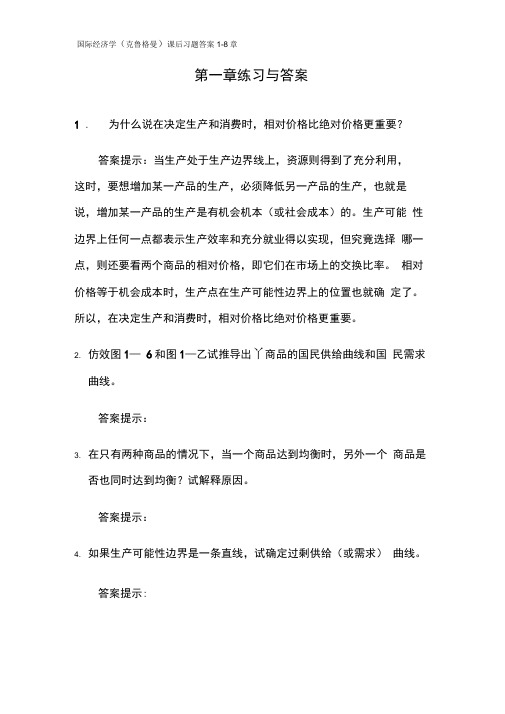
第一章练习与答案1 . 为什么说在决定生产和消费时,相对价格比绝对价格更重要?答案提示:当生产处于生产边界线上,资源则得到了充分利用,这时,要想增加某一产品的生产,必须降低另一产品的生产,也就是说,增加某一产品的生产是有机会机本(或社会成本)的。
生产可能性边界上任何一点都表示生产效率和充分就业得以实现,但究竟选择哪一点,则还要看两个商品的相对价格,即它们在市场上的交换比率。
相对价格等于机会成本时,生产点在生产可能性边界上的位置也就确定了。
所以,在决定生产和消费时,相对价格比绝对价格更重要。
2. 仿效图1—6和图1—乙试推导出丫商品的国民供给曲线和国民需求曲线。
答案提示:3. 在只有两种商品的情况下,当一个商品达到均衡时,另外一个商品是否也同时达到均衡?试解释原因。
答案提示:4. 如果生产可能性边界是一条直线,试确定过剩供给(或需求)曲线。
答案提示:5. 如果改用丫商品的过剩供给曲线(B国)和过剩需求曲线(A 国)来确定国际均衡价格,那么所得出的结果与图1 —13中的结果是否一致?答案提示:国际均衡价格将依旧处于贸易前两国相对价格的中间某点。
6. 说明贸易条件变化如何影响国际贸易利益在两国间的分配。
答案提示:一国出口产品价格的相对上升意味着此国可以用较少的出口换得较多的进口产品,有利于此国贸易利益的获得,不过,出口价格上升将不利于出口数量的增加,有损于出口国的贸易利益;与此类似,出口商品价格的下降有利于出口商品数量的增加,但是这意味着此国用较多的出口换得较少的进口产品。
对于进口国来讲,贸易条件变化对国际贸易利益的影响是相反的。
7. 如果国际贸易发生在一个大国和一个小国之间,那么贸易后,国际相对价格更接近于哪一个国家在封闭下的相对价格水平?答案提示:贸易后,国际相对价格将更接近于大国在封闭下的相对价格水平。
& 根据上一题的答案,你认为哪个国家在国际贸易中福利改善程度更为明显些?答案提示:小国9* .为什么说两个部门要素使用比例的不同会导致生产可能性边界曲线向外凸?答案提示:第二章答案1.根据下面两个表中的数据,确定(1)贸易前的相对价格;(2)比较优势型态。
《大学英语(1)》课后练习答案与部分课文译文

《大学英语(1)》课后练习答案与部分课文译文★课后练习参考答案:Unit 1 现在时1、I'm afraid I can't finish the work ___________to help me.A. unless you will comeB. unless you comeC. until you will comeD. until you shall come正确答案:B答案讲解:在时间、条件状语从句中,往往用一般现在时来表示将来的动作,故可以排除A、C 和D。
根据题意,选择“除非你来帮我,否则我恐怕完不成工作”更合情理,所以答案为B。
2、We can go when the ground____________.A. is dryingB. has driedC. driedD. dry正确答案:B答案讲解:有时为了明确在时间上分句动作的完成先于主句的动作,也可用现在完成时表示将来某一时刻前完成的动作,但不能用将来完成时的形式。
因此,答案为B,意为“当地面干了以后,我们就可以走了。
”3、Come and sit down by the fire. Your hand____________.A. feel so coldlyB. is feeling so coldC. feels so coldD. is felt so cold正确答案:C答案讲解:主语your hand是单数形式,谓语动词也应选择单数形式,故可以排除A。
表示主语具有的特征、状态时应用一般现在时,故又可以排除B。
表示某物给人以某种感觉时应用主动语态,所以选C,意为“过来坐在火边,你的手很凉”。
4、Various programs____________on TV. World news____________best received.A. will show, areB. are shown, isC. are showing, isD. have shown, are正确答案:B答案讲解:第一句话的主语various programs是复数,故应选择复数的谓语动词,而第二句话的主语world news是单数,要对应单数的谓语动词,这样便可以排除A和D。
三年级年级荷花课后练习精选(含答案)1

三年级年级荷花课后练习精选(含答案)1学校:___________姓名:___________班级:___________考号:___________评卷人得分一、选择题1.下列句子中与其它三句意思不相同的一项是()A.难道那画家的本领了不起吗?B.那画家的本领可真了不起。
C.难道那画家的本领不了不起吗?D.那画家的本领真了不起啊!【答案】A2.下列句子中没有语病的一项是()A.《荷花》的作者是叶圣陶写的。
B.坚持写日记,写作能力就会迅速提高。
C.这种不爱惜劳动成果,任意浪费,是可耻的。
D.我们要增强克服困难的信心和方法。
【答案】B3.下列词语搭配有误的一项是()。
A.这么多的白荷花,一朵有一朵的(姿态)。
B.他们走在回家的路上,唱起了一首(轻快)的歌曲。
C.这只小狗的鼻子真(灵敏),老远就闻到了食物的气味。
D.他的双手十分(灵活),不一会儿,就捏好了一个栩栩如生的泥人。
【答案】A4.“如果把眼前的一池荷花看作一大幅活的画,那画家的本领可真了不起。
”意思理解有误的一项是()A.能把这一池荷花画下来的画家可真了不起。
B.这“一大幅活的画”是大自然的杰作,大自然才是了不起的画家。
C.这一池荷花不仅很美,而且竞相开放,充满生机和活力,因此作者把它看作是一幅活的画。
而这位了不起的画家正是美妙的大自然。
D.这位了不起的画家正是美妙的大自然。
【答案】A5.下列词语中注音全部正确的一项是()A.姿势.(shì)饱胀.(zhàng)花瓣儿..(bànr)B.莲蓬.(peng)衣裳.(shang)胀.裂(zàng)C.挨挨...(gūduor)..挤挤(ái)花骨朵儿D.闲散.(sàn)木杆.(gān)似.的(shì)【答案】A6.下列句子中没有使用修辞手法的一项是()A.荷叶挨挨挤挤的,像一个个碧绿的大圆盘。
B.如果把眼前的一池荷花看作一大幅活的画,那画家的本领可真了不起。
科学七年级下牛顿第一定律课后练习精选(含答案)1
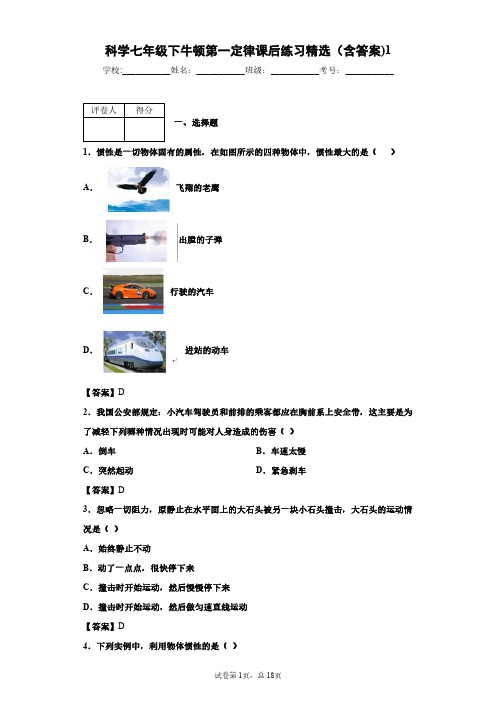
A.向右转弯 B.向左转弯
C.加速行驶 D.刹车制动
【答案】A
28.跳远运动员总是先跑一段距离才起跳,这是为了( )
A.增大惯性 B.减小惯性
C.克服惯性 D.利用惯性
【答案】D
试卷第 7页,总 18页
29.在日常生活中,我们常有下列一些经历或体验。其中,与物理学中所说的惯性有关 的是( ) A.明知自己的某个习惯动作不好,可是很难在短期内彻底改正 B.公交车往往是开开停停,因而给乘客们带来后仰前俯的烦恼 C.提着较重的物体走路,时间长了会感到手臂肌肉酸痛 D.长时间看书,突然抬头看远处的景物会感到模糊 【答案】B 30.在火车车厢中做跳远实验,正确的结论是( ) A.在静止的火车车厢中向前跳得较远 B.火车在匀速直线运动时,朝车行驶的方向跳得远 C.火车在匀速直线运动时,朝车行驶的反方向跳得远 D.以上三种情况一样远 【答案】D 31.一个物体在 10N 拉力作用下,以 1 m/s 的速度做匀速直线运动。当物体所受外力突 然全部消失时,物体将( ) A.立即停止 B.以小于 1 m/s 的速度做匀速直线运动 C.速度越来越慢,最后停止运动 D.以 1 m/s 的速度做匀速直线运动 【答案】D 32.放在一辆足够长的表面光滑的平板车上的两个物体,随着车一起在水平方向上作匀 速直线运动,当车突然停止时,这两个物体在车上会(不考虑空气阻力)( ) A.一定不相碰 B.一定相碰 C.若两个物体质量相等,一定相碰 D.若两物体质量不相等,一定相碰 【答案】A 33.2012 年、6 月 18 日,“神舟九号”飞船与“天富一号”实施自动交会对接。如图所示 为即将对接时的模拟图,成功对接后,“神舟九号”内的航天员看到“天官一号”纹丝不动, 地球在缓缓转动,则航天员选择的参照物是( )
语言学课后练习(附参考答案)
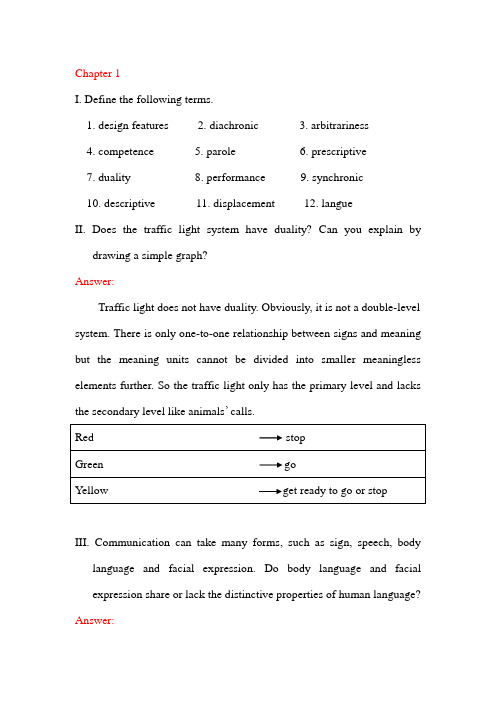
Chapter 1I. Define the following terms.1. design features2. diachronic3. arbitrariness4. competence5. parole6. prescriptive7. duality 8. performance 9. synchronic10. descriptive 11. displacement 12. langueII. Does the traffic light system have duality? Can you explain by drawing a simple graph?Answer:Traffic light does not have duality. Obviously, it is not a double-level system. There is only one-to-one relationship between signs and meaning but the meaning units cannot be divided into smaller meaningless elements further. So the traffic light only has the primary level and lacks the secondary level like animals’ calls.III. Communication can take many forms, such as sign, speech, body language and facial expression. Do body language and facial expression share or lack the distinctive properties of human language? Answer:On the whole, body language and facial expression lack most of the distinctive properties of human language such as duality, displacement, creativity and so on. Body language exhibits arbitrariness a little bit. For instance, nod means “OK/YES” for us but in Arabian world it is equal to saying “NO”. Some facial expressions have non-arbitrariness because they are instinctive such as the cry and laugh of a newborn infant.IV. Why is the distinction between competence and performance important in linguistics? Do you think the line can be neatly drawn between them? How do you like the concept communicative competence?Answer:This is proposed by Chomsky in his formalist linguistic theories. It is sometimes hard to draw a strict line. Some researchers in applied linguistics think communicative competence may be a more revealing concept in language teaching than the purely theoretical pair---competence and performance.Chapter 2I. Define the following terms.1. phonetics2. consonant3. allophone4. vowel5. assimilation6. syllable7. intonation8. phonology 9. phoneme 10. toneII. Give the description of the following sound segments in English.1. [ð]2. [ʃ]3. [ŋ]4. [d]5. [p]6. [k]7. [l]8. [i]9. [u:] 10. [ɔ]Answers:1. [ð]: voiced dental fricative2. [ʃ]: voiceless postalveolar fricative3. [ŋ]: velar nasal4. [d]: voiced alveolar stop5. [p]: voiceless bilabial stop6. [k]: voiceless velar stop7. [l]: (alveolar) lateral 8. [i]: high front unrounded lax vowel9. [u:]: high back rounded tense vowel10. [ɔ]: low back rounded lax vowelIII. Give the IPA symbols for the sounds that correspond to the descriptions below.1. voiceless labiodental fricative2. voiced postalveolar fricative3. palatal approximant4. voiceless glottal fricative5. voiceless alveolar stop6. high-mid front unrounded vowel7. high central rounded vowel 8. low front rounded vowel9. low-mid back rounded vowel10. high back rounded tense vowelAnswers:1. [f]2. [Ʒ]3. [j]4. [h]5. [t]6. [e]7. [ʉ]8. [ɶ]9. [ɔ] 10. [u:]IV. To what extent is phonology related to phonetics and how do they differ?Answer:Phonetics is the branch of linguistics studying the characteristics of speech sounds and provides methods for their description, classification and transcription. Phonology is the study of sound systems that occur in a language and the patterns where they fall in. Minimal pairs, phonemes, allophones, free variation, complementary distribution, etc., are all to be investigated by a phonologist.Both are concerned with the same aspect of language----the speech sounds. But they differ in their approach and focus.Phonetics is of general nature; it is interested in all the speech sounds used in all human languages; it focuses on chaos. Phonology aims to discover how speech sounds in a language form patterns and how these sounds are used to convey meaning in linguistic communication. A phonologist studies what he believes are meaningful sounds related with their semantic features, morphological features, and the way they are conceived and printed in the depth of the mind. Phonological knowledge permits a speaker to produce sounds which form meaningful utterances, to recognize a foreign “accent”, to make up new words, to add theappropriate phonetic segments to form plurals and past tenses, to know what is and what is not a sound in one’s language. It focuses on order.V. The pronunciation of tell is [teɫ], but that of teller is [telə]. Discuss why the phoneme /l/ is realized as [ɫ] and [l] respectively in this situation.Answer:The word teller is formed by adding a suffix –er to the base word tell to form a new word. We are all familiar with the rule that governs the allophones of the phoneme /l/: when preceding a vowel, it is [l] and when following a vowel it is [ɫ]. However, in teller it has a vowel both before and after it, so how do we decide that it should be pronounced as [l], not [ɫ]?We notice that tell is a monosyllabic word while teller is disyllabic. In a polysyllabic word, we follow the Maximal Onset Principle (MOP) for the division of syllable. By MOP, the [l] must be placed in the onset position of the second syllable instead of the coda position of the first syllable. Thus, the phoneme [l] is realized as it should be before the vowel in the second syllable. The same is true with telling, falling, and many others. We can see from this that the phonological structure of a complex word is often different from its morphological structure, i.e. how the word is formed. In word-formation it is tell+-er while in syllablestructure it is [te+lə].Chapter 3I. Define the following terms.1. morpheme2. affix3. allomorph4. free morpheme5. derivation6. stem7. blending8. back-formation9. inflection 10. root 11. bound morpheme 12. acronym II. Complete the words with suitable negative prefixes.a. removable m. syllabicb. formal n. normalc. practicable o. workabled. sensible p. writtene. tangible q. usualf. logical r. thinkableg. regular s. humanh. proportionate t. relevanti. effective u. editablej. elastic v. mobilek. ductive w. legall. rational x. discreetAnswers:a.irremovable m. dissyllabicrmal n. abnormalc.impracticable o. unworkabled.insensible p. unwrittene.intangible q. unusualf.illogical r. unthinkableg.irregular s. inhumanh.disproportionate t. irrelevanti.ineffective u. uneditablej.inelastic v. immobilek.inductive w. illegall.irrational x. indiscreetIII. Morpheme is defined as the smallest unit in terms of relationship between expression and content. Then is morpheme a grammaticalconcept or a semantic one? What is its relation to phoneme? Can amorpheme and a phoneme form an organic whole?Answer:Since morpheme is defined as the smallest unit of language in terms of relationship between expression and content, a unit that cannot be divided into further smaller units without destroying or drastically altering the meaning, whether it is lexical or grammatical, that is, it is involved both in grammatical and semantic aspects.A single phoneme may represent a single morpheme, but they are not identical. For example, the phoneme /s/ in ‘looks’, ‘tapes’, ‘Frank’s’, ‘race’ is the same one, yet they represent different morphemes or even is not a morpheme individually. The phoneme /s/ in ‘looks’: the third-person singular present tense morpheme; the phoneme/s/ in ‘tapes’: the plural morpheme; the pho neme /s/ in ‘Frank’s’: the possessive case morpheme; the phoneme /s/ in ‘race’: is not a morpheme, for it has neither lexical meaning or grammatical meaning.Morphemes may also be represented by phonological structure other than a single phoneme. In other words, a morpheme may overlap with a phoneme, such as I, but usually not, as in pig, in which the morpheme is the whole word, i.e. an independent, free morpheme, but the phonemes are /p/, /i/ and /g/.Chapter 4I. Define the following terms.1. syntax2. constituent3. subordination4. endocentric5. category6. construction7. exocentric8. coordinateII. Put brackets around the immediate constituents in each sentence.1.I rode back when it was dark.2.The boy was crying.3.Shut the door.4.Open the door quickly.5. The happy teacher in that class was becoming away.6. He bought an old car with his first pay cheque.Answers:1.((I) ((rode) (back))) ((when) ((it) ((was) (dark)))).2.((The) (boy)) ((was) (crying)).3.(Shut) ((the) (door)).4.((Open) ((the) (door))) (quickly).5. ((The) (((happy) (teacher)) ((in) ((that) (class))))) ((was) ((becoming) (away))).6. (He) ((( bought) ((an) ((old) (car)))) ((with) ((his) ((first) ((pay)(cheque)))))).III. For each of the underlined constructions or word groups, do the following.—State whether it is headed or non-headed.—If headed, state its headword.—Name the type of constructions.e.g.: His son will be keenly competing.Answer: headed; headword—competing; verbal group(a) Ducks quack.(b) The ladder in the shed is long enough.(c) I saw a bridge damaged beyond repair.(d) Singing hymns is forbidden in some countries.(e) His handsome face appeared in the magazine.(f) A lady of great beauty came out.(g) He enjoys climbing high mountains.(h) The man nodded patiently.(i) A man roused by the insult drew his sword.Answers:(a) non-headed; independent clause(b) non-headed; prepositional phrase(c) headed; headword---damaged; adjectival group(d) headed; headword---singing; gerundial phrase(e) headed; headword---face; nominal group(f) non-headed; prepositional phrase(g) headed; headword---climbing; gerundial phrase(h) non-headed; independent clause(i) headed; headword---roused; adjectival phraseChapter 5 MeaningI. Define the following terms.1. conceptual meaning2. denotation3. connotation4. reference5. sense6. synonymy7. gradable antonymy 8. complementary antonymy9. converse antonymy 10. relational opposites11. hyponymy 12. superordinateII. Do the following according the requirements.(a) Write out the synonyms of the following words:youth; automobile; remember; purchase; vacation; big (b) Give the antonyms of the following words:dark; boy; hot; go; lend; male(c) Provide two or more related meanings for the following:bright; to glare; a deposit; planeAnswers:(a) youth: adolescent automobile: carremember: recall purchase: buyvacation: holidays big: large(b) dark: light boy: girlhot: cold go: comelend: borrow male: female(c) bright: a. shining; b. intelligentto glare: a. to shine intensely; b. to stare angrilya deposit: a. minerals in the earth; b. money in the bankplane: a. a flying vehicle; b. a flat surface。
《政府与非营利组织会计》课后练习参考答案
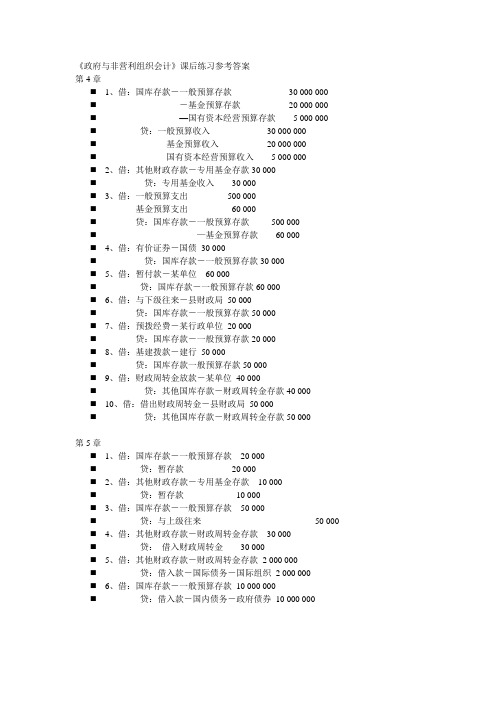
《政府与非营利组织会计》课后练习参考答案第4章⏹1、借:国库存款-一般预算存款30 000 000⏹-基金预算存款20 000 000⏹—国有资本经营预算存款 5 000 000⏹贷:一般预算收入30 000 000⏹基金预算收入20 000 000⏹国有资本经营预算收入 5 000 000⏹2、借:其他财政存款-专用基金存款30 000⏹贷:专用基金收入30 000⏹3、借:一般预算支出500 000⏹基金预算支出60 000⏹贷:国库存款-一般预算存款500 000⏹—基金预算存款60 000⏹4、借:有价证券-国债30 000⏹贷:国库存款-一般预算存款30 000⏹5、借:暂付款-某单位60 000⏹贷:国库存款-一般预算存款60 000⏹6、借:与下级往来-县财政局50 000⏹贷:国库存款-一般预算存款50 000⏹7、借:预拨经费-某行政单位20 000⏹贷:国库存款-一般预算存款20 000⏹8、借:基建拨款-建行50 000⏹贷:国库存款一般预算存款50 000⏹9、借:财政周转金放款-某单位40 000⏹贷:其他国库存款-财政周转金存款40 000⏹10、借:借出财政周转金-县财政局50 000⏹贷:其他国库存款-财政周转金存款50 000第5章⏹1、借:国库存款-一般预算存款20 000⏹贷:暂存款20 000⏹2、借:其他财政存款-专用基金存款10 000⏹贷:暂存款10 000⏹3、借:国库存款-一般预算存款50 000⏹贷:与上级往来50 000⏹4、借:其他财政存款-财政周转金存款30 000⏹贷:借入财政周转金30 000⏹5、借:其他财政存款-财政周转金存款2 000 000⏹贷:借入款-国际债务-国际组织2 000 000⏹6、借:国库存款-一般预算存款10 000 000⏹贷:借入款-国内债务-政府债券10 000 000第6章⏹1、借:国库存款-一般预算存款800 000⏹-基金预算存款100 000⏹贷:一般预算收入-税收收入-增值税600 000⏹-营业税200 000⏹基金预算收入-政府住房基金收入100 000⏹2、借:其他财政存款-专用基金存款400 000⏹贷:专用基金收入-粮食风险金400 000⏹3、借:其他财政存款-财政周转金存款313 000⏹贷:财政周转金收入-资金占用费收入13 000⏹财政周转金放款-某行政单位100 000⏹借出财政周转金-县财政局200 000⏹4、借:国库存款-一般预算存款5 000⏹贷:补助收入-一般预算补助5 000⏹5、借:国库存款-一般预算存款30 000⏹贷:上解收入-一般预算上解收入30 00⏹6、借:调出资金-从基金预算调出资金60 000⏹贷:国库存款-基金预算存款60 000⏹借:国库存款-一般预算存款60 000⏹贷:调入资金-从基金预算调入资金60 000⏹7、借:暂付款-政府采购款500 000⏹贷:国库存款-一般预算存款500 000⏹借:其他财政存款-政府采购款500 000⏹贷:暂存款-政府采购款500 000⏹8、借:暂存款-政府采购款500 000⏹贷:其他财政存款-政府采购款500 000⏹借:一般预算支出500 000⏹贷:暂付款-政府采购款500 000⏹9、借:基金预算支出-社会保障和就业-残疾人事业300 000⏹贷:国库存款-基金预算存款300 000⏹10、借:专用基金支出-粮食风险基金200 000⏹贷:其他财政存款-专用基金存款200 000⏹11、借:财政周转金支出-占用费支出5 000⏹贷:其他财政存款-财政周转金存款5 000⏹12、借:补助支出-基金预算补助10 000⏹贷:国库存款-基金预算存款10 000⏹13、借:上解支出一般预算上解支出30 000⏹贷:国库存款-一般预算存款30 000⏹13、借:财政专户管理的资金支出80 000⏹贷:其他财政存款-财政专户管理资金存款80 000⏹15、⏹借:调出资金-从基金预算调出资金60 000⏹贷:国库存款-基金预算存款60 000⏹借:国库存款-一般预算存款60 000⏹贷:调入资金-从基金预算调入资金60 000⏹16、借:国有资本经营预算支出—地震灾后恢复重建支出 1 000 000⏹贷:国库存款—国有资本经营预算存款 1 000 000第7章略。
大学英语[全新版(第二版)]-综合教程[B1]-课后练习参考答案[U1-2]-更新中 (1)
![大学英语[全新版(第二版)]-综合教程[B1]-课后练习参考答案[U1-2]-更新中 (1)](https://img.taocdn.com/s3/m/6848e98951e79b896802264b.png)
说明:此参考答案仅供参考,错漏之处敬请谅解!冯老师Part II Language FocusVocabularyI.1.1. respectable2. agony3. put…down4. sequence5. hold back6. distribute7. off and on8. vivid9. associate 10. finally 11. turn in 12. tackle2.1. has been assigned to the newspaper’s Paris office.2. was so extraordinary that I didn’t know whether to believe him or not.3. a clear image of how she would look in twenty years’ time.4. gave the command the soldiers opened fire.5. buying bikes we’ll keep turning them out.3.1. reputation, rigid, to inspire2. and tedious, What’s more, out of date ideas3. compose, career, avoid showing, hardly hold backⅡ. Synonyms in Context1. composed2. severe3. agony4. extraordinary5. recall6. command7. was violating8. anticipate Ⅲ. Collocation1. at2. for3. of4. with5. as6. about7. to 8. in, in 9. from 10. on/uponComprehensive ExercisesⅠ. Cloze1.1. hold back2. tedious3. scanned4. recall5. vivid6. off and on7. turn out/in8. career2.1. last2. surprise3. pulled4. blowing5. dressed6. scene7. extraordinary8. image9. turn 10. excitement Ⅱ. Translation1.1. As it was a formal dinner party, I wore formal dress, as Mother told me to.2. His girlfriend advised him to get out of/get rid of his bad habit of smoking before it took hold.3. Anticipating that the demand for electricity will be high during the next few months, they have decided to increase its production.4. It is said that Bill has been fired for continually violating the company’s safety rules. /Bill is said to have been fired for continually violating the company’s safety rules.5. It is reported that the government has taken proper measures to avoid the possibility of a severe water shortage. /The local government is reported to have taken proper measures to avoid the possibility of a severe water shortage.2.Susan lost her legs because of / in a car accident. For a time, she didn’t know how to face up to the fact that she would never (be able to) walk again.One day, while scanning (through) some magazines, a true story caught her eye /she was attracted by a true story. It gave a vivid description of how a disabled girl became a writer. Greatly inspired, Susan began to feel that she, too, would finally be bale to lead a useful life.I. Vocabulary1. Fill in the gaps with words or phrases given in the box.1) absolutely 2) available 3) every now and then4) are urging/ urged 5) destination 6) mostly 7) hangs out 8) right away 9) reunion 10) or something11) estimate 12) going ahead2. Rewriting1) It seemed that his failure in the examination was still on his mind.2) He was completely choked up by the sight of his team losing in the final minutes of the game.3) She was so lost in study that she forgot to have dinner.4) Something has come up and I am afraid I won’t be able to accomplish the project on time.5) The cost of equipping the new hospital was estimated at $2 million.3. Complete the sentences.1) were postponed; the awful; is estimated;2) reference; not available; an kind of;3) not much of a teacher; skips; go ahead;II. Collocation1. to2. for3. at4. from5. in6. to on7. on8. withIII. Usage1. more or less2. kind of/ sort of3. something4. kind of/ sort of5. more or less6. or somethingComprehensive exercisesI. Cloze1. text-related1) choked up 2) awful 3) practically 4) neighborhood5) correspondence 6) available 7) destination 8) reunion9) Mostly 10) postponing 11) absolutely2. Theme-related1) how 2) savings 3) embarrassment 4) phone 5) interrupted 6) touch 7) envelop 8) signed 9) message 10) needed II. Translation1. Translate the sentences.1) Half an hour had gone by, but the last bus hadn’t come yet. We had to walk home.2) Mary seems to be very worried about the Chinese exam because she hasn’t learned the texts by heart.3) Since the basketball match has been postponed, we might as well visit the museum.4) He stayed in Australia with his parents all the way through WWⅡ.5) Since I graduated from Nanjing University in 1985, I have kind of lost touch with my classmates.2. Translate the passage.It is not easy to keep in touch with friends far away. This is true in my case.It has been a couple of years since I left my old neighborhood and all the friends I had there. I have been meaning to write to them but something or other come up and I just don’t seem to find the time. They are always on my mind, however, and I think I will certainly make an effort to keep up correspondence with them in the future.。
- 1、下载文档前请自行甄别文档内容的完整性,平台不提供额外的编辑、内容补充、找答案等附加服务。
- 2、"仅部分预览"的文档,不可在线预览部分如存在完整性等问题,可反馈申请退款(可完整预览的文档不适用该条件!)。
- 3、如文档侵犯您的权益,请联系客服反馈,我们会尽快为您处理(人工客服工作时间:9:00-18:30)。
第2课《学会查“无字字典”》4、读课文,说说爸爸是怎样解释“骄阳似火”、“惊涛拍岸”的,并把有关的句子画下来。
爸爸在解释这两个词语时,采取的方法不是灌输,而是通过提问,以及在由此产生的对话中聪聪进行启发。
解释“骄阳似火”,爸爸联系被烈日“晒蔫”的树叶引导聪聪获得真实的感受;解释“惊涛拍岸”,爸爸是在聪聪观察大海波涛的基础上,引导聪聪由眼前的情景去体会“惊涛拍岸”的意境。
具体句子见文中。
第4课《做一片美的叶子》4、假如你就是大树上那片美丽的叶子,你会想些什么?你会对大树、对人们说些什么?答:如果我是大树上那片美丽的叶子,我是大树的一部分,我要为大树而生,把阳光变成生命的乳汁奉献给大树。
我会对大树说:“大树妈妈,没有您,我是无法生存的,我一定尽自己的力量,为您输送营养,让您变得更加茁壮、青翠。
”我还要对人们说:“社会如同一棵大树,你们就是树上那一片平凡的叶子,你们也要为社会作贡献,让社会变得更加美丽。
”练习一口语交际《小小读书交流会》交流时请有条理地说说自己最近读过的书的书名、作者以及书的内容。
范例:我的读书交流会我最近读了中国古典文学名著《三国演义》,作者是罗贯中,主要讲了汉朝末年,魏、蜀、吴三国争霸天下的故事,这本书可精彩啦!有过五关斩六将的关羽,有神机妙算的诸葛亮,有能在万军之中取敌人首级的赵云。
一个个生动的故事,一个个鲜明的人物,读来令人爱不释手。
相信今天我的讲述,一定会引起你阅读《三国演义》的兴趣,那就拿起书来读一读,到时候,我们也可以来一个“品茶论英雄”嘛!第5课《北大荒的秋天》4、说说下面的词各表示什么颜色。
每读一个你联想到什么?你能再找几个这种类型的词吗?(1)银灰:像白银那样的灰色;血红:像鲜血那样的红色;橘黄:像橘子那样的黄色:金黄:像金子那样的黄色。
(2)读后会依次联想到白银、血、橘子、黄金。
(3)类似的词语还有:枣红、草绿、雪白、墨黑、杏黄、天蓝、苹果绿、鸡冠红等。
第6课《西湖》读句子,任选两个带点的词语说话。
1、平静的湖面,犹如一面硕大的银镜。
2、孤山东边的白堤和西南的苏堤,就像两条绿色的绸带,轻柔地漂浮在碧水之上。
3、明净的湖水晃动着绿岛和白云的倒影,仿佛仙境一般。
4、岸边的华灯倒映在湖中,宛如无数的银蛇在游动。
例子:犹如:南湖公园,犹如一颗明珠镶嵌在美丽的南端。
像:圆圆的月亮像硕大的银盘挂在空中。
仿佛:母亲河南北贯穿,蜿蜒曲折,仿佛一串银链。
宛如:万里长城宛如一条巨龙卧在山峦之间。
练习二口语交际当有人敲门的时候当一个人在家时,必须通过门镜(猫眼)或询问,弄清敲门人身份,才决定是否开门。
如果是亲朋好友,或非常熟悉的人,就要开门纳客,充满热情,礼貌待客。
如果是陌生人,不要开门,但说话要得体:“对不起,我不认识你,你要找的人不再家,如果有急事,是否让我用电话联系你要找的人。
”“请问,您找谁?您是哪一位?您与要找的人是什么关系?对不起,您要找的人不在家。
”第8课《蒲公英》4、假如你是太阳公公,会怎样劝告那两颗想落到沙漠里湖泊里的小种子?答:我会劝告它们,做事不要被表面现象所迷惑,要实事求是,不要有不切实际的幻想。
第9课《三袋麦子》4、小猪、小牛、小猴的做法你最赞成谁的?为什么?如果是你,会怎么做?假如你喜欢小猴,可以这么回答:我最赞成小猴的做法,因为它通过自己的劳动创造出更多的财富。
第11课《第八次》4、请你想象一下:当时布鲁斯会怎样动员几乎失去信心的士兵起来参加第八次抵抗?参考答案:布鲁斯受到了蜘蛛结网精神的启发,他会告诉参战的士兵,要重新振作精神,鼓舞斗志,决不灰心,必须坚持不懈地继续努力,总有一天会取得成功的。
第12课《卧薪尝胆》结合课文说说“卧薪尝胆”的意思。
“卧薪”指睡在柴草上,“尝胆”指品尝苦胆。
“卧薪尝胆”指刻苦自励,发奋图强的精神。
第13课《世界上第一个听诊器》4、读读下面的句子,并用带点的词语造句。
1、一个人如果有了疾病,他的内脏运动就会出现异常。
2、通过木板,在另一头能清楚地听到划木头的声音!雷奈克试了试,声音果然沿着木板传了过来。
如果。
就。
:如果你做事三心二意,就会一事无成。
果然:这次演讲比赛,我感觉发挥不错,成绩揭晓后,我果然获得了一等奖。
第14课《“东方之珠”》3、词语造句倾听:夏天的夜晚,在月光下倾听海浪拍岸发出的声音是一种享受。
闪耀:晴朗的夜空,闪耀着数不清的星星。
3、仿照第五节的写法,围绕“一到休假日,街上就热闹起来”写一段话。
一到休假日,街上就热闹起来了。
马路上车水马龙,大大小小的汽车像一条长龙。
人行道上人头攒动。
三人一伙,五个一群地走在大街上。
有的到商店买东西,有的去品尝美食,有的去公园玩,人人笑容满面。
路旁的商店里摆放着琳琅满目的商品,挤满了前来购物的男女老少。
大家在商店里选购自己喜欢的东西,个个脸上笑开了花。
第15课《小露珠》4、造句越来越。
越来越。
窗外,雨越下越大,风越刮越猛。
4、默读课文,说说为什么大家都喜欢小露珠。
小动物喜欢小露珠是因为小露珠闪亮、透明、圆润,外表美丽。
植物们喜欢小露珠是因为它把所有的植物都装点得格外精神,使植物们显得更加生机勃勃,所以大家都喜欢小露珠。
第16课《石榴》4、读下面的句子,说说这样写好在哪里。
1、熟透了的石榴高兴地笑了,有的笑得咧开了嘴,有的甚至笑破了肚皮,露出满满的子儿。
2、这些石榴娃娃急切地扒开绿黄色的叶子朝外张望,向人们报告着成熟的喜讯。
运用拟人的修辞手法,生动、形象地写出了石榴成熟时惹人喜爱的样子。
5、品尝一种水果,并仿照课文第四自然段写一段话。
成熟了的葡萄,紫红色的、碧绿色的,一半紫一半绿的,个个晶莹透明,好像一颗颗不同颜色的宝石。
轻轻扒开葡萄皮,一个嫩嫩的果肉呈现在你的眼前。
果肉半透明的看上去像水晶,像玛瑙。
散发着迷人的香味,使人口水直流。
迫不及待地放入口中,细嚼一下,香甜可口的汁水一下子渗遍全身,那甜滋滋的味道始终留在我的嘴里,久久不会消失。
让人回味无穷。
第17课《石头书》联系课文说说“刨根问底”的意思。
川川和磊磊从石头书中“刨”到了哪些学问?“刨根问底”的意思是追究底细,寻求根源。
文中指两个孩子不停地向勘探队员发问,想要弄清有关岩石的许多知识。
川川和磊磊从石头书中“刨”到了石头书中的“字”和“画”,它们能告诉我人们地球的历史,告诉我们哪座山下埋着煤炭,哪块地下藏着矿石。
第18课《小稻秧脱线记》3、造句激烈:经过激烈的思想斗争,他决定把这次参赛的机会让给小丽。
纷纷:在讨论会上,同学们纷纷发言,表达了对搞好班级卫生的看法。
练习6口语交际:介绍我的小制作自制漫画瞧,这是一张我自己制作的漫画。
蓝蓝的天,绿绿的大树,清清的河里还有小鱼在游泳呢!其实制作漫画很简单。
首先,取一张漫画制作卡,挑选与图案相配的沙子,然后轻轻揭开上面的沙子,然后轻轻揭开上面的纸片,倒上沙子,沙子就粘在了有胶水的制作卡上了。
你可以根据自己的喜好,将不同的地方沾上不同颜色的沙子,还可以个根据图案的远近粘上多少不等沙子以体现层次感。
最后提醒大家的是,在揭纸时要细心、耐心,一层一层地来,一点一点地粘,否则,漫画就成了大花脸,看不清图案了。
第20课《军神》为什么沃克医生称刘伯承为“军神”?术前,刘伯承坚决不使用麻醉药,甘愿忍受巨大疼痛的坚定态度。
术中,他忍受剧痛却一声不吭,把新床单都抓破了。
术后,刘伯承不仅忍受剧痛,还一直在数刀数。
沃克医生被刘伯承的坚忍不拔的精神深深感动,赞扬他是一位了不起的“军神”。
第21课4、想一想“小英在大家的注视下,终于一摇一晃地走上了讲台。
”你认为大家注视的目光中包含了什么?大家注视的目光中包含着对小英的关心、鼓励、支持与信任。
“说也奇怪,从那次演讲以后,小英像变了一个人似的。
”小英有哪些变化?为什么会有这些变化?从那次演讲以后,小英不再忧郁,变得活泼、开朗。
这是因为她从同学们的掌声中找到了信心,获得了前进的动力,鼓起了生活的勇气,她很珍惜这宝贵的掌声。
第22课《金子》4、彼得的梦想是什么?他是怎样实现自己的梦想的?你有什么梦想呢?答:彼得的梦想是找到金子,发财致富。
彼得是这样实现梦想的:他在雨后肥沃的土地上种花。
靠自己的辛勤劳动获得了成功、财富,发现生活的真谛,找到了真正的金子。
练习7口语交际:小小展销会买东西“卖东西。
”“卖书了!”“教室里闹极了,同学们在干什么呀?哦!原来同学们在开展小小展销会。
有小飞机,有机器人,有玩具熊,还有一本本图书。
”你想买这个漂亮的小火车吗,如果装了电池,上面的灯还会一闪一闪的,同时你如果打开开关,能放出《祝你生日快乐》的歌曲,只要五元就能买到。
”晨晨一听,就高兴地买下了这个玩具。
第23课《每逢佳节倍思亲》结合课文内容说说“每逢佳节倍思亲”这句诗的意思。
参考答案:平时久别故乡是很思念亲人的,特别是爱美好的节日就更加思念家中的亲人。
第24课《孙中山破陋习》4、读一读,体会每组中两句话的意思有什么不同。
1、妈妈把孙中山推出了房门。
2、妈妈含着眼泪把孙中山推出了房门。
第二句话更能表现妈妈既同情女儿,又无力反抗封建习俗的矛盾心里。
这件事深深地刺痛了他幼小的心,深深地更能说明这件事对孙中山的影响程度之深。
6、什么叫“陋习”?问问周围的老人,以前生活中还有哪些陋习?把你了解到的写下来。
陋习指不合理的习惯和风俗。
以前缠足、一夫多妻、近亲繁殖、要寡妇守寡、三纲五常、男尊女卑、占卜算命、搞封建迷信的陋习,现在依然存在的陋习有乱扔废弃物、乱倒垃圾和污水的陋习,随地吐痰、公共场所抽烟以及随便丢掉烟头。
练习5:处处留心因为昆明气候温暖,四季如春,百花常开,所以我们称它为春城。
因为广州有“五羊衔谷”的传说,所以我们称它为羊城。
称济南为冰城,是因为哈尔滨冬季寒冷,冰冻很厚。
潍坊制作风筝很出名,因此我们称潍坊为鸢都。
重庆城市建在山上,因此我们称重庆为山城。
练习8处处留心青山有幸埋忠骨,白铁无辜铸佞臣。
忠骨指的是岳飞的遗骸,佞臣指的是四个铁人,这四个铁铸的奸臣是:秦桧。
王氏、(或写秦桧夫妇)、张俊、万俟卨。
